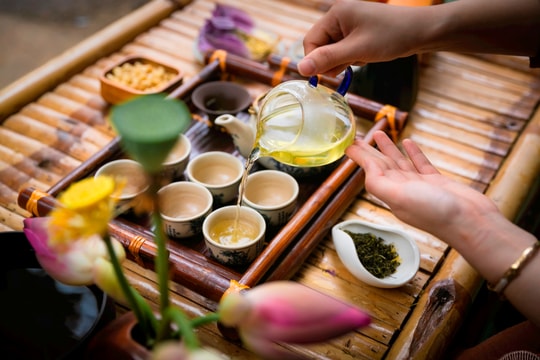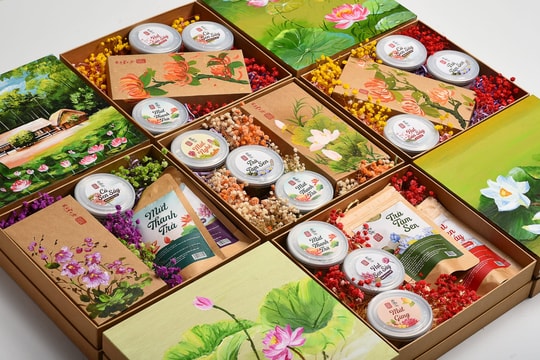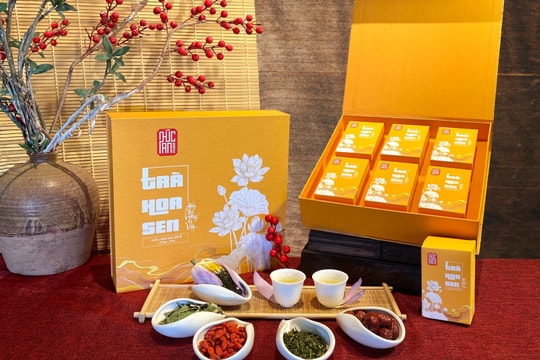Lotus-scented tea from Nghe An: A quintessential 'treasure' from nature
Tea is a “treasure” distilled from nature, especially lotus tea. In Nghe An, lotus tea is considered one of the premium teas, famous since ancient times, contributing to the unique flavor of Vietnamese tea culture.

Tea is“treasure"The essence of nature,especially must mention the tea scented with rose flowersn.In Nghe An, lotus-scented tea is considered one of thepremium tea, famous since ancient times; contributes to creating aromasharpunique in Vietnamese tea culture.
Sen Village - Where the quintessence of heaven and earth converges
Since ancient times, lotus flowers have been closely associated with the material and spiritual life of the Vietnamese people. In the Vietnamese mind, lotus flowers are a symbol of purity, clarity, nobility and are also considered the national flower, symbolizing the spirit and identity of the Vietnamese soul.
Sen Village (Kim Lien Commune, Nam Dan District, Nghe An Province) - the hometown of beloved Uncle Ho, a place that in the minds of the people of the whole country is the "common homeland". Returning to the "common homeland", who does not gently step through the "red hibiscus hedges"; who does not stand in front of the fragrant lotus fields, deeply inhaling the noble fragrance of the beautiful national flower.
According to the elders in Kim Lien commune, the name Lang Sen - Uncle Ho's paternal hometown - originated from the fact that there were two lotus ponds growing naturally here. The village was named after the flower, so beautiful and so delicate, as a reminder to the children to preserve a humble and pure lifestyle forever.
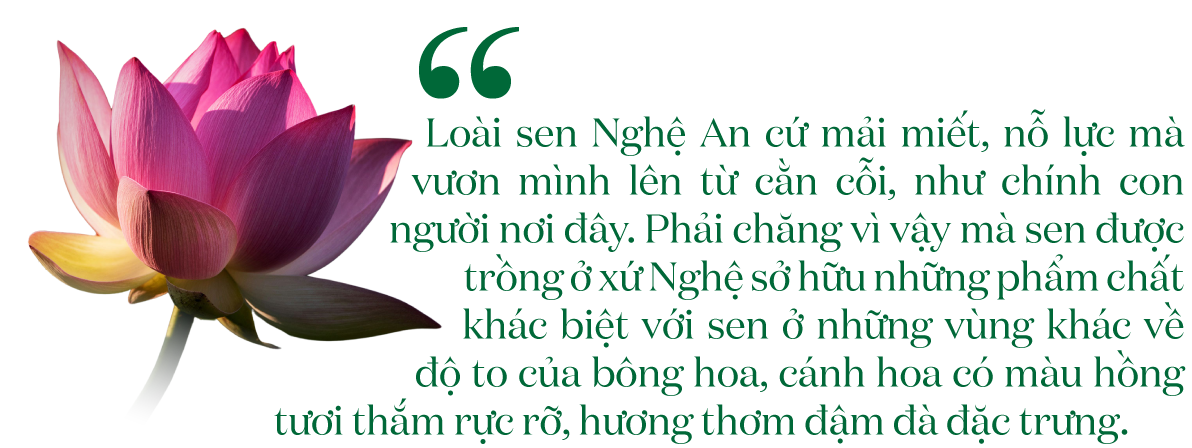
It is also strange that this small flower, so fragile yet so strong. The lotus grows in harsh weather conditions, blooming brilliantly in the hot, dry season. The Kim Lien lotus, Nam Dan, is tirelessly and arduously trying to rise from the barrenness, just like the people here. Perhaps that is why the lotus grown in Nghe An possesses different qualities from lotus in other regions in terms of the size of the flower, the bright pink petals, and the characteristic rich fragrance.
The lotus is also a strange plant, when from root to tip there is nothing that is not useful. Many parts of the lotus are precious medicinal herbs to cure diseases and improve human health. Talking about lotus is endless, praising lotus is endless. That small flower that grows from the swamp has "entered" into folk songs, poetry, literature, cinema...; "entered" into the daily meals of Nghe An people; and "goes" everywhere, carrying the aspiration to bring Nghe An cuisine and tourism to friends from all over.
Nowadays, the lotus growing area in Kim Lien commune is increasingly expanding. The government and people of Kim Lien commune have built and embellished lotus ponds to create landscapes and develop the economy through processing and selling lotus products. It is estimated that the total lotus growing area in Kim Lien is about 30 hectares.
The essence of lotus scented tea
The scent of lotus flowers is the quintessence of heaven and earth. Therefore, lotus tea is a precious item, in the past only noble families could enjoy it.
Not as formal and elegant as lotus tea from other places, not strictly following the elaborate tea-drinking rules, but Nghe An lotus tea is marked by its rusticity, closeness and simplicity. Nghe An lotus-scented tea only needs to focus on the quality of tea and lotus, along with the scenting technique and a few small notes when brewing to have a delicious pot of tea. The ideal place to enjoy lotus tea can be under the porch or right on the field, overlooking the vast green lotus pond with the wind. Tea drinkers can enjoy the scenery, write poetry, chat or contemplate freely.
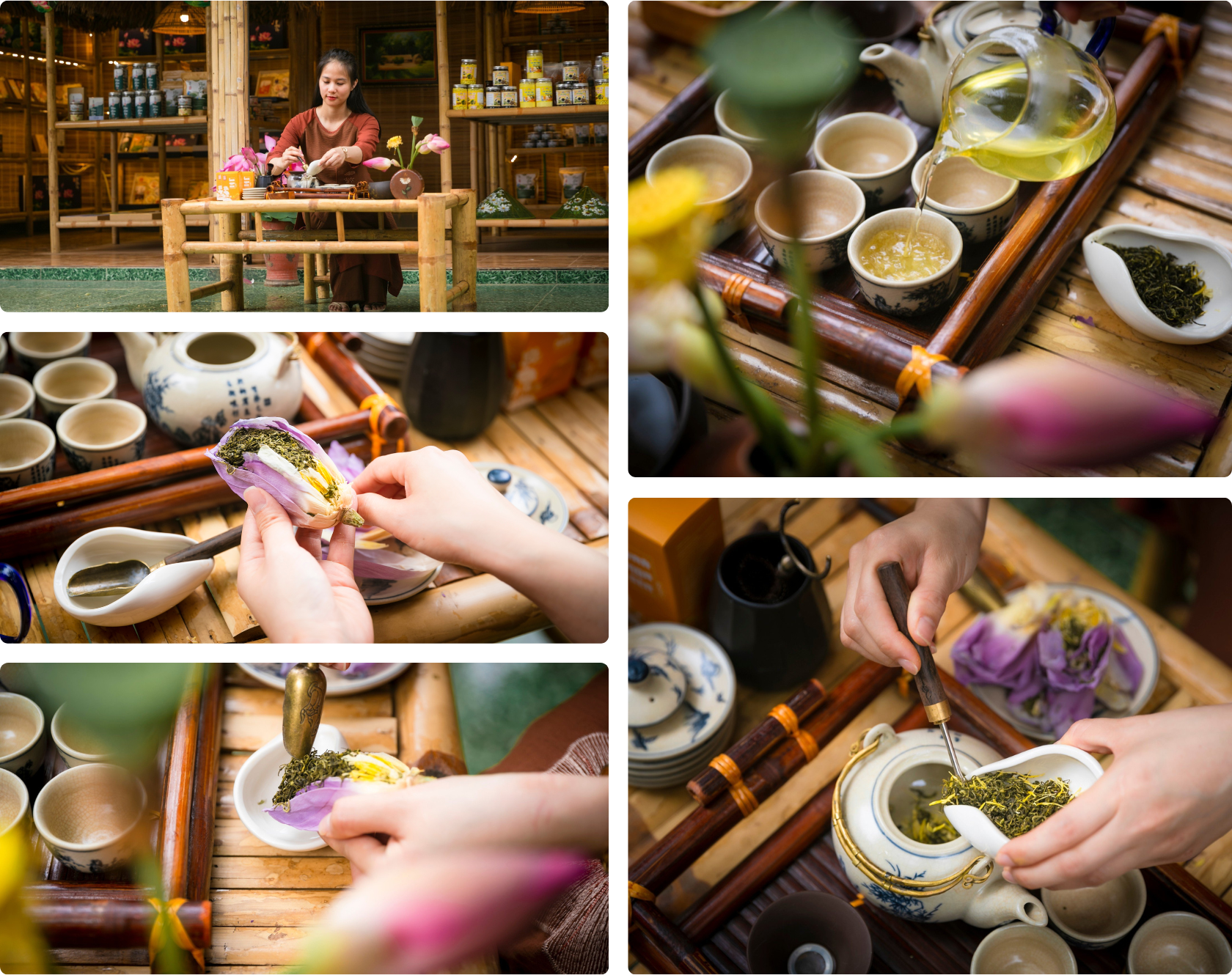
Right on the land of Uncle Ho's hometown, Sen Village, the lotus scented tea brandPhuc An Farmwas formed and born by the people born and raised on this land.
Phuc An Farm lotus tea buds are produced from lotus flowers grown in Uncle Ho's homeland, with the care and dedicated research of the people here. Therefore, Phuc An Farm lotus scented tea has become the top choice, not only because of its quality but also because of its ability to connect and express deep sincerity.
Phuc An Farm's lotus ponds are cultivated entirely using organic methods. Phuc An Farm's lotus tea products have been certified with 3-star OCOP certification at the provincial level, committed to not mixing any flavorings, only the natural scent of lotus flowers. The production process, cultivation, fertilization, harvesting, and preliminary processing to create finished products are all strictly carried out according to a closed process.
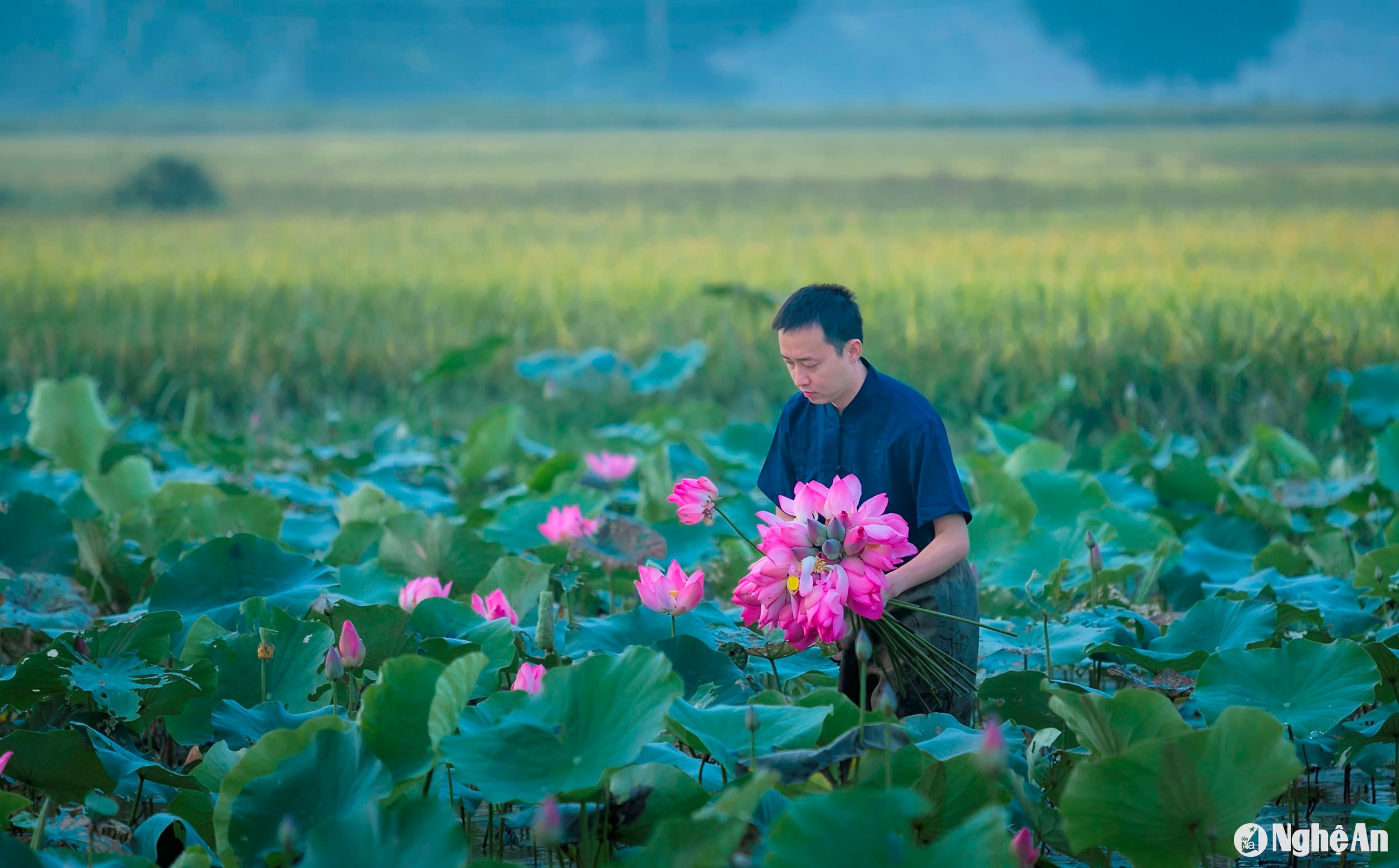
Lotus flowers usually bloom when the sun rises. Therefore, the lotus picking process also needs to be done at the right time in the early morning when the sky has just brightened. At this time, the dew and the essence of heaven and earth still remain in the lotus flower's calyx and pistil, which is the moment to fully preserve the lotus's fragrance. Lotus flowers must also be selected from half-open flowers, fully bloomed, not too big or too small. With careful selection, usually out of 300 - 400 lotus flowers, tea makers at Phuc An Farm can only choose about 100 flowers that meet the standards.
Each lotus petal and pistil is carefully selected, without haste. This is the moment when the tea maker deeply connects with the earth and sky, feeling every breath of nature. They seem to blend into the slow, quiet rhythm of the universe, to find peace of mind.
The next important step is to get the lotus rice, which requires meticulousness, dexterity and delicacy. Lotus rice is white grains shaped like rice grains, on slender yellow pistils. This is the bag that holds the lotus flower's fragrance. Getting lotus rice also requires a completely closed space, limiting fans, avoiding drying the rice, losing the fragrance as well as impurities. Tea makers try to get the rice as quickly as possible when picking lotus from the pond, avoiding affecting the lotus scent. The lotus rice after being separated from the lotus flower is then used to infuse with tea; it takes 1,500 - 2,000 lotus flowers to get the rice to infuse one kilogram of lotus tea.
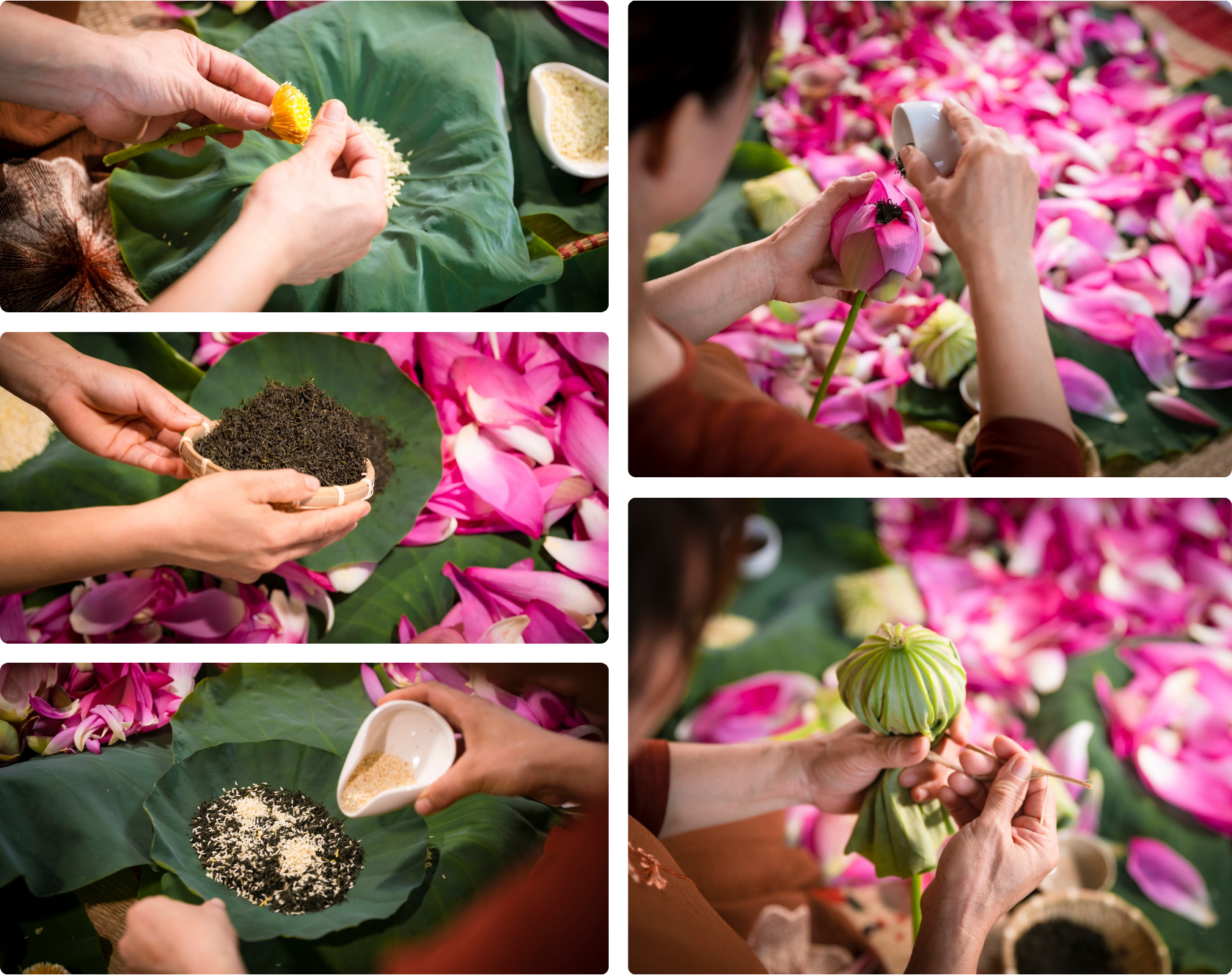
The tea used to scent the lotus is also carefully selected. The type of tea that Phuc An Farm chooses to scent the lotus is ancient Shan Tuyet tea from Ha Giang, which grows completely naturally on the top of high mountains, covered in clouds all year round. Or using high-class tea buds and tea buds from Thai Nguyen. Each type of tea brings a different flavor, depending on the needs and tastes, giving customers more choices.
An equally important step is the tea infusion, alternating a layer of tea with a layer of lotus rice spread evenly on the surface, then incubated for about 24 to 48 hours, depending on the room temperature. During this time, the artisans will continuously check, when the tea reaches the desired aroma, they will move on to the drying stage. This is the stage that determines whether the finished tea is successful or not. The drying must be done so that the lotus-infused tea is both dry and fragrant to meet the standard.
To have quality products, Phuc An Farm has invested in and equipped with advanced, modern machinery, using freeze-drying technology. The drying process from deep freezing to freeze-drying takes 48-60 hours to have the most standard batch of tea, beautiful flowers that are still fragrant. With this modern drying technology, the full flavor of tea and lotus will be preserved, imbued with the essence of heaven and earth. Finally, the finished product will be packed in a vacuum bag for careful preservation.

In addition to the above method of brewing “rice” lotus tea, there is also a method of brewing “instant” lotus tea. This method will shorten the time to produce the finished product but cannot be preserved for a long time like the above method. Tea makers still choose to pick the half-flowered, standard flowers early in the morning. Next, the tea farmers gently and skillfully separate the lotus petals and put the tea into the lotus flower to brew. Finally, the lotus flower will be tied tightly with soft strings and placed in water. Overnight, when the lotus petals bloom, the tea is finished brewing, and the tea can be taken out to enjoy.
For tea makers, lotus-scented tea is not just a commodity, but also a hidden part of their soul. Each batch of tea is a work of art, an expression of love and devotion. When the lotus scent spreads, when the tea flavor permeates, tea drinkers will feel not only the sweetness of the tea, but also the patience and enthusiasm of the tea maker.
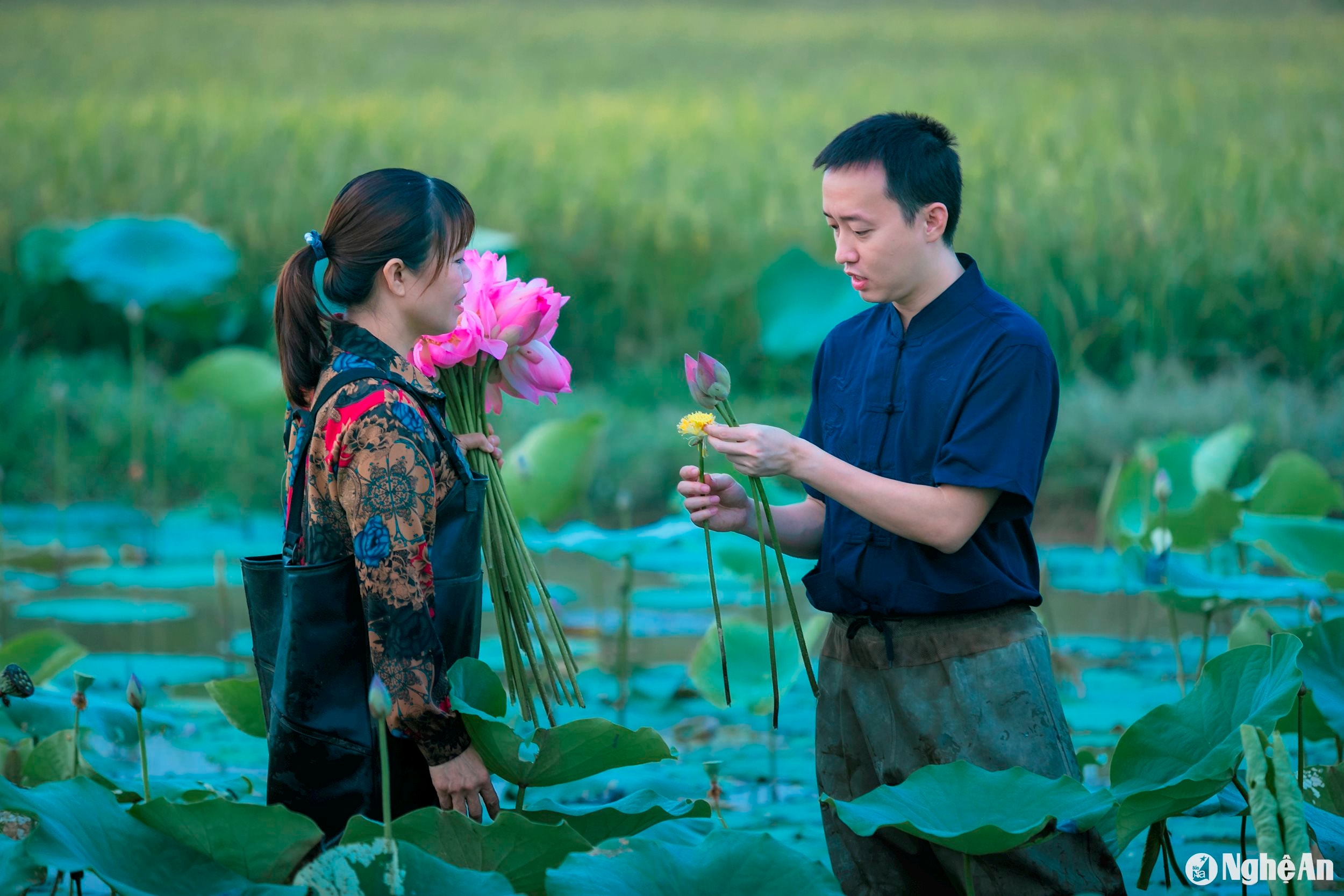
Mr. Nguyen Xuan Huy - founder of Phuc An Farmshared: “Phuc An Farm lotus scented tea is not only a hometown agricultural product, but also contains the soul and spirit of Nghe An. Each cup of lotus tea is the crystallization of the land and the soul of the people here, bringing a rich, delicate flavor; at the same time showing the sincerity and respect of the tea maker and the giver”.


